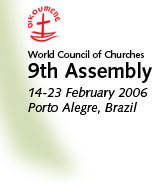 |
WCC > Home > News & media > News | ||||
| About the assembly | Programme | Theme & issues | News & media | |||||
 |
|
||||
|
14.11.04
Enthusiasm and commitment: Brazilian churches are ready for the ninth WCC Assembly
Photos available free of charge, see below
World Council of Churches (WCC) general secretary Rev. Dr Samuel Kobia lauded the enthusiasm and commitment of Brazilian Churches to prepare for the ninth WCC Assembly.
"I am extremely satisfied with the enthusiasm and commitment of Brazilian Churches regarding this Assembly, a key factor in the success of this kind of event," said Kobia after visiting Porto Alegre from 9 to 12 of November as part of his first visit to Latin America. "This is a genuine enthusiasm, which also includes Roman Catholic Church representatives we have spoken with," he said.
Kobia added that, together with the local coordination, entrusted to Pastor Rui Bernhard, several working groups have been created and will guarantee a careful preparation process. During his visit to Porto Alegre he participated in the meeting of the Assembly Planning Committee established by the WCC, and met with National and Local committees made up of churches' representatives from Brazil and Porto Alegre.
The WCC general secretary also visited the Pontifical Catholic University (PUC) where the Assembly will take place. After meeting with dean Norberto Rauch, vice dean Joaquim Clotet and other university authorities, Kobia toured part of the university and was extremely satisfied with the facilities.
PUC representatives expressed their desire that the role of the university not to be limited to merely providing infrastructure but to participate in a more active manner.
<span style="font-weight: bold; "»» Support from authorities
The WCC general secretary met with the governor of the state of Rio Grande do Sul, Germano Rigotto, and invited him to participate in the Assembly's inaugural act. "We will be bringing the world to Rio Grande do Sul," said Kobia, who also underlined the cordial welcome of the local churches as a very auspicious sign of the quality that will mark the event.
The governor expressed the willingness of the state to be considered a partner and an ally and said he would do whatever he could to ensure the success of the Assembly which he believes will give the state greater visibility. He also underscored the importance of themes like overcoming violence and poverty, which will be central during the event.
The mayor of the city of Porto Alegre Joao Verle also welcomed Kobia and emphasized the ecumenical practice in the city. While there will be a new administration in February 2006 when the Assembly takes place, Verle said he is confident that incoming authorities will also be willing to collaborate.
During these visits Kobia was accompanied by the president of the Evangelical Church of the Lutheran Confession in Brazil (IECLB), pastor Walter Altmann and Catholic archbishop of Porto Alegre Dom Dadeus Grings.
<span style="font-weight: bold; "»» Ecumenical formation and mission
The WCC general secretary visited the IECLB Theological School (EST) in Sao Leopoldo, some 30 kilometers from Porto Alegre. Dean Prof. Dr Lothar Hoch and vice dean Prof. Martin Volkmann presented the work of the school to Kobia.
The WCC general secretary then offered a class to post-graduate students. Kobia invited them to participate in the 'mutirao' that will take place parallel to the official Assembly program and underscored its value as an important opportunity for ecumenical formation.
During the visit to the EST, Kobia also visited the IECLB's Mission among Indigenous Commission (COMIN). The work of the commission focuses on issues of land, health, education and indigenous rights. "But the central issue of reconciliation is present in all the work," said one of the two coordinators, pastor Hans Trein.
The first German immigrants who reached Brazil at the beginning of the 19th century, poor families who had no opportunities or place in Germany, were used by the Brazilian government to spearhead its land occupation policy involving land that belonged to indigenous people. The church was both a victim and an accomplice in this situation and part of the journey toward reconciliation involves supporting indigenous people in the struggle for their rights, according to COMIN.
Among other initiatives, the commission works to recover and re-value indigenous languages. "The indigenous themselves, reflecting the ideology of the oppressor, considered them ‘dialects' when in some cases they are more complex than some European languages," said the other commission coordinator, pastor Arteno Spellmeier.
Kobia underlined the importance of this work and said that a similar situation takes place in Africa. Some people speak one or more African languages as well as English and/or French but will only refer to these when asked what languages they speak, he said.
- - -
The WCC general secretary visit to Latin American continues in Brazil (Porto Alegre), Argentina (Buenos Aires), Uruguay (Montevideo) and Chile (Santiago).
A detailed programme of the visit as well as high resolution photos are available in: www.wcc-coe.org > Press Corner > Latin America visit
|
|||
|
|
|

